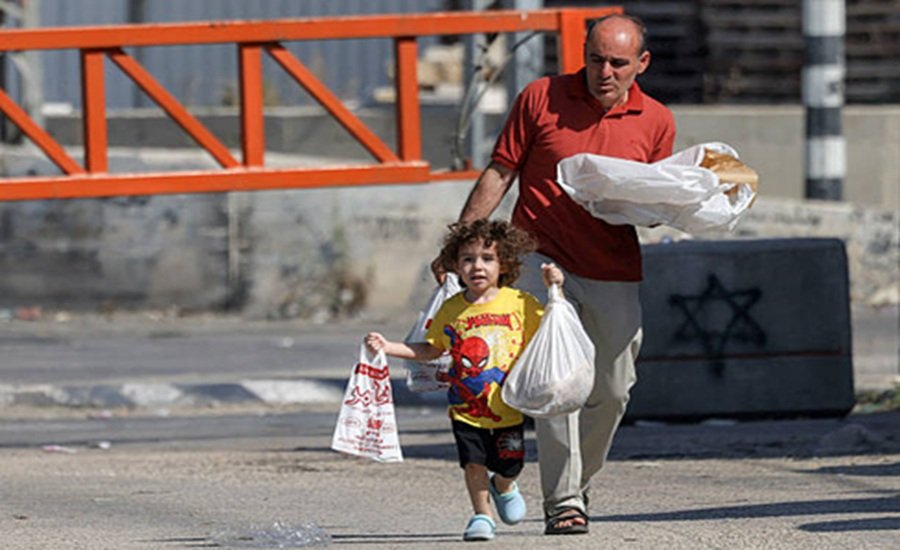WHEN nearly 2,000 Palestinian detainees were released in the latest prisoner exchange, many expected freedom to taste different. Instead, they walked out of one prison and into another; the occupied West Bank, now carved by over 1,000 Israeli checkpoints, military barriers, and iron gates.
From Hebron to Nablus, Palestinians describe a land split into jails within jails, where every road, village, and city is locked behind metal gates that open and close at Israel’s will.
According to figures obtained by Quds News Network, Israel installed 19 new iron gates in just the first three months of 2025. If this pace continues, the year will end with more than 76 new gates, a 290% increase from last year.
Cities like Hebron are the most suffocated, with 229 permanent barriers. Ramallah follows with 156, and Nablus with 148. In the north, entire villages such as Deir Sharaf and Beita have been fenced in. Roads like Route 17, linking Nablus and Asira al-Shamaliya, are sealed. Other towns, including Kafr Malik, Silwad, and Hizma, are accessible only through gates that can close without warning.
According to the Palestinian Economic Policy Research Institute (MAS), these barriers cost the West Bank economy millions every month. Palestinians collectively lose over 191,000 hours of work daily, amounting to more than 4.2 million hours per month; the equivalent of 526 full workdays stolen from an already exhausted labor market.
And while 2,000 were released in the exchange, 9,000 Palestinians remain held in Israeli jails. The rest live in open-air ones, scattered behind gates, fences, and watchtowers.
Life Inside the Gates
Over the past two years, Israel has transformed daily life in the West Bank into a system of jails within jails, where every gate, road, and neighborhood becomes another layer of control. Conversations with paramedics, taxi drivers, students, and residents of Hebron’s Old City reveal a picture of suffocating restriction, where freedom of movement has all but vanished.

A man and child walk with their purchases from a local bakery past the closed gate of an Israeli checkpoint in Deir Sharaf, west of Nablus, in the occupied West Bank.
I
n Bethlehem, paramedics describe a growing humanitarian nightmare. Hamed, an ambulance driver working night shifts, called Israel’s new metal barricades “the biggest obstacle to saving lives.”
“These barriers look modern and shiny,” he said, “but one day they could be the reason you or your loved ones die.”
He recalled several cases where patients lost their lives because ambulances were delayed by the closures. “Some reached hospitals too late. Others arrived lifeless, covered in sheets.”
Dreams Stopped at Checkpoints
For many young Palestinians, the barriers have stolen dreams as well as time.
Maram, a psychology student from Hebron, once dreamed of studying at Al-Quds Bard University in Jerusalem, an hour’s drive away before October 2023.
Now, the journey takes up to four hours, if it’s even possible. “I didn’t want to waste years of my youth between checkpoints and transportation,” she said. “I gave up my dream. God help Gaza’s students; they’ve lost everything. My struggle is nothing compared to theirs.”
Confinement as Normal Life
Interviews with residents reveal how confinement has become normalized.
Ahmad, a 19-year-old from Bethlehem, said nothing really changed after October 2023 because his family had already stopped moving freely.
“My father was imprisoned by Israel for eight years,” Ahmad said. “He doesn’t let us go beyond our grandparents’ neighborhood. He says he doesn’t want us to see soldiers.”
Among friends, dark humor fills the silence. “With all these new gates,” one joked, “soon they’ll install one at every neighborhood.” Another added, “Maybe they’ll separate our homes next, one gate for each bathroom.”
A City Under Lockdown
Nowhere are these restrictions harsher than in Hebron’s Old City, where checkpoints, walls, and gates divide every street. The area has been under direct military control for decades, but residents say life after October 2023 has reached new extremes.
“After October 7, we were locked inside for four months. Even now, we’re allowed outside only at specific hours,” said Abu Imad Jaber, who lives near the Ibrahimi Mosque.
Residents are banned from walking freely, sitting outside, or even standing near windows. Meanwhile, settlers move without restriction under army protection.
“Every soldier here is his own government,” Jaber said. “If one doesn’t want you to pass, you won’t, even if his commander allows it.”
During the four-month curfew, Jaber’s wife fell critically ill. Since ambulances were banned from entering, he carried her on foot until reaching a point where paramedics were allowed to pick her up.
His neighbor, Abu Safwan Al-Salaymeh, a 60-year-old cancer patient, died waiting for an ambulance that soldiers refused to let through. Another neighbor, Abdul Hakam Al-Salaymeh, suffered permanent paralysis after an hour-and-a-half delay at a checkpoint while soldiers waited for “authorization.”
The consequences reach even deeper. Repair workers refuse to enter Hebron’s Old City for fear of settlers, leaving families to fix their homes alone. Social ties are breaking too.
“No one wants to marry our daughters or let their daughters marry our sons,” Jaber said. “Who wants their children trapped in a neighborhood they can’t visit?” Since October 2023, at least twenty families have left the area.
From Hebron to Nablus, Bethlehem to Ramallah, Israel’s vast network of iron gates and military barriers has turned the West Bank into a scattered archipelago of prisons.
Every road is a potential checkpoint. Every gate, a new wall. Every delay, another hour of stolen life.
The system doesn’t just control movement; it reshapes identity, shrinking what it means to live, study, work, or dream in what remains of Palestine.
In the words of one taxi driver:
“They call it security. We call it a prison without walls.” — QNN

